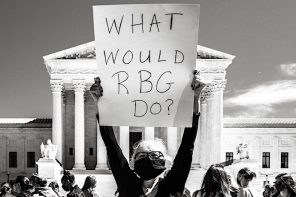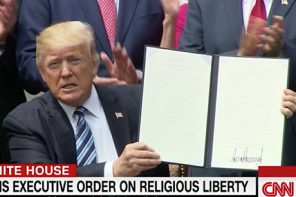This Thursday, September 25th, is the cut-off date for public comments on the Department of Health and Human Services’ proposed regulations concerning the expansion of the so-called “conscience clause” of the 2004 Weldon Amendment, which would ban federal funds from medical establishments that “discriminate” against health care providers or institutions by requiring them to participate in or provide referrals for abortion services—very broadly defined. In an early draft of the regulations leaked in July, the HHS proposed that abortion, under its definition, included any procedure, action or drug “that results in the termination of the life of a human being in utero between conception and natural birth, whether before or after implantation.” This follows an extremist antiabortion belief that some forms of contraception function as abortion by hypothetically preventing the implantation of a fertilized egg. By defining abortion to include any contraceptive that could prevent pregnancy by preventing implantation rather than fertilization—though it’s virtually unknowable whether a particular contraceptive is functioning this way—the HHS broke with the American Medical Association’s longstanding definition of pregnancy. Instead, the administration chose to side with a growing anticontraception religious movement, which only numbers in the tens of thousands but has an outsized influence in spreading its ideology through the growing support of churches and religious bodies.
The reaction to the leaked draft was immediate and last month sociologist Carol Joffe, author of Doctors of Conscience, wrote about the commonsense objection of medical professionals and abortion rights advocates to the HHS move: that after eight years of Bush administration attempts to curtail abortion rights, they now propose a policy “that virtually assures there will be more abortions” by making it more difficult to obtain the contraception that will prevent unwanted pregnancies. “The proposal,” Joffe wrote, “very cleverly speaks to two main policy objectives of the Religious Right: to change the cultural—as well as bureaucratic—understanding of contraception, and to further the cause of ‘health worker refusals’—the growing movement of individuals who withhold access to various medications and procedures with which they have political disagreement.”
In response to the public outcry from reproductive rights advocates, the official proposal was subsequently revised, though the alterations merely omitted the sections that defined birth control as abortion without substituting a more medically-recognized definition of abortion and pregnancy, meaning that individual health care entities would still be free to define birth control as abortion. HHS Secretary Mike Leavitt further denied on his blog that he intended the regulations to concern contraception or abortion but merely the issue of “the legal right medical practitioners have to practice according to their conscience and patients should be able to choose a doctor who has beliefs like his or hers.” Not even his anticontraception supporters believe the turnaround, though. The Family Research Council, the political arm of James Dobson’s Focus on the Family, spurred its followers to battle this week with an action alert to lobby the HHS in support of the new regulations, and in particular, to urge that the regulations apply to contraception. The FRC’s pre-written form letter for the HHS specifically charges the department to cover the “reasonable beliefs” of antiabortion health care workers who think “that the destruction of that life, whether before or after implantation, constitutes an abortion.” “At the very least,” they write, “the regulations should specifically protect the conscience of an individual or organization which believes a given practice is an abortion because it involves the taking of human life from fertilization to birth.”




